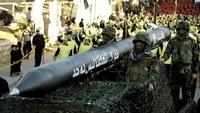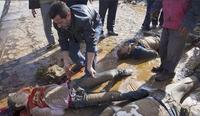-
Allowing Terrorism Risk Insurance Act to expire could hurt national security: Study
The current terrorism risk insurance program has a $27.5 billion threshold for aggregate losses that are paid by the insurance industry and commercial policyholders before the government program begins paying. The program will expire in 2014 and Congress again is considering the appropriate government role in terrorism insurance markets. Allowing the federal terrorism risk insurance act to expire could have negative consequences for U.S. national security, according to a new study from the RAND Corporation.
-
-
Software spots malicious behavior by apps
Last year at the end of July the Russian software company Doctor Web detected several malicious apps in the app store Google Play. Downloaded on a smartphone, the malware installed — without the permission of the user — additional programs which sent expensive text messages to premium services. German computer scientists have now developed software which can discover such malicious apps already in the app store. The software detects pieces of code where the app accesses sensitive data and where data is sent from the mobile device.
-
-
Gangbangin' in Syria: Two L.A. gang members in Syria to defend Assad regime
About a hundred Americans have gone to Syria to take part in the war, all of them — with the apparent exception of two L.A. gang members named “Creeper” and “Wino” — to fight on the side of the Sunni rebels against the Alawite Assad regime. In a video recently posted on YouTube, the two are shown brandishing AK-47s and firing at an unseen enemy. Their tattoos identify one of them as a member of Sureños-13, which is affiliated with the Mexican mafia, and the other as a member of Westside Armenian Power gang. They tell the camera they are “in Syria, gangbangin’.”
-
-
Biometric security for mobile devices becoming mainstream
Biometric security such as fingerprint, face, and voice recognition is set to hit the mainstream as global technology companies market the systems as convenient and easy to use. The latest biometric technologies are not without their security issues, but they are marketed as more convenient than traditional methods rather than more secure, and encourage adoption by people who currently do not have any security on their phone at all.
-
-
Collecting digital user data without compromising privacy
The statistical evaluation of digital user data is of vital importance for analyzing trends. It can also undermine users’ privacy. Computer scientists have now developed a novel cryptographic method that makes it possible to collect data and protect the privacy of the user at the same time.
-
-
Too much too young? Teaching children about violent extremism
Dealing with the rise of homegrown terrorism has prompted governments to take novel approaches in combating such threats. The U.K. government, for example, has recently pushed for schools to teach children as young as four about the dangers of violent extremism. One counter-radicalization strategy adopted by the U.K. government is Prevent, which has been used effectively in British secondary schools. Prevent has in the past been viewed with suspicion, however, particularly by British Muslim communities, as Prevent funding has previously been tied directly to the number of Muslim schools in an area. What Australia can learn from the British example is ensuring that certain communities do not feel alienated. Instead, any attempts at education should focus on the problem of radicalization as a whole.
-
-
Israel intercepts ship carrying Syrian missiles from Iran to Gaza
In its most daring – and logistically demanding –military operation in about a year, Israeli naval commandos earlier yesterday (Wednesday) intercepted an Iranian arms ship in the Red Sea, more than 900 miles from Israeli shores. The ship was carrying dozens of Syria-manufactured M-302 medium-range missiles from Iran to Islamic Jihad in the Gaza Strip. The M-302 missile would have dramatically increased the capabilities of militant organizations in Gaza. It carries a warhead of 150 kg and has a range of about 300km.
-
-
Securing Industry 4.0
An increasing number of unsecured, computer-guided production machinery and networks in production facilities are gradually evolving into gateways for data theft. New security technologies may directly shield the sensitive data that is kept there.
-
-
$38.2 billion for DHS in FY2015 budget proposal; $1.25 billion in cyber funding
The administration’s FY 2015 budget proposal, submitted to Congress on Tuesday, requests $38.2 billion in non-disaster funding for DHS, which is nearly a 3 percent reduction relative to FY 2014 allocation, but about the same as FY 2013. The proposal asks for about $1.25 billion – or 3 percent of the requested $38.2 billion – for cyber security funding, up from the $792 million in cybersecurity funding Congress approved for DHS in FY 2014. Of the $1.3 billion, about $1 billion will go for cyber initiatives, including funding for a new voluntary program for critical infrastructure companies and money to bolster civilian network security.
-
-
Libyan Islamists tried to ship mustard gas to Syrian rebels

Libyan officials report that they have recently apprehended several members of a Libyan Muslim extremist militia planning to ship chemical weapons to anti-Assad rebels in Syria. Colonel Mansour al-Mazini of the Libya army said that the Islamists had been caught with a container of mustard gas. The gas was confiscated by Libyan soldiers.
-
-
Energy Department suspends work on controversial plutonium reprocessing project

The Obama administration has decided to put on hold its plans to complete construction on a South Carolina reprocessing facility which would convert nuclear weapon-grade plutonium into reactor fuel. The suspension of work on the project is part of the fiscal 2015 budget plan the administration unveiled Tuesday. The project has been hobbled by delays and massive cost-overruns, and experts says security and safety concerns have not been adequately addressed.
-
-
Two politicians insisting on more congressional oversight of DHS
The lawmakers who support the proposed DHS Acquisition Accountability and Efficiency Act, authored by Representative Jeff Duncan (R-South Carolina), are doing exactly what they were sent to Washington to do: they are attempting to provide fiscal oversight over one of our largest federal agencies. Hopefully, politicians on both sides of the aisle will join Representatives Duncan and Michael McCaul (R-Texas) in passing legislation forcing DHS to use tax payer money in the most efficient ways possible, including demanding contractors meet the terms of their contracts, not rewarding contractors who have a record of poor performance, and completing their security-related projects in a timely manner.
-
-
Proposed 2015 budget cuts funding for nuclear nonproliferation programs
The Obama administration 2015 budget proposal shows that the administration will spend less on nuclear nonproliferation initiatives in 2015 than it would in 2014. The budget of the National Nuclear Security Administration (NNSA), the agency responsible for various nuclear weapons and nuclear nonproliferation programs, will be cut by 20 percent, from the $1.9 billon Congress approved for fiscal 2014 — which in turn was a $289 million cut from fiscal 2013 levels — to $1.6 billion in 2015.
-
-
Egyptian court bans all Hamas activities
An Egyptian earlier today (Tuesday) banned all activities of Hamas, a Palestinian offshoot of the Egyptian Muslim Brotherhood. Hamas has been in control of the Gaza Strip since summer 2007. In December, the Egyptian government declared the Muslim Brotherhood to be a terrorist group, freezing its assets, making membership in the group a crime, and banning all its political activities. The Egyptian military, now holding effective power in Egypt, has always regarded Hamas as a security threat, accusing the group of supporting Islamist insurgency in the Sinai Peninsula and Islamists radicals inside Egypt.
-
-
Militant Islamism in Russia is the product of outside influences

Muslims in Russia, who belong to Turkic ethnic groups (this includes the largest Muslim group in Russia, the Tatars), practice moderate Sunni Islam of the Hanafite school. Russian Muslims living in the Caucasus Mountains practice Sunni Islam of the Shafiite school. A large number of Russian Muslims also follow Sufi orders — Naqshbandi, Qadiri, and others. The radicalization of some Russian Muslims began in the early 1990s with Saudi-financed madrassas where radical and fundamentalist strands of Islam were taught, and where Islamist militants were trained, and with Saudi-financed radical preachers spreading “true Islam.” The madrassas were closed in 2000, and the fundamentalist preachers ordered out of the country, but by then enough Russian Muslims were already radicalized.
-
More headlines
The long view
Factories First: Winning the Drone War Before It Starts
Wars are won by factories before they are won on the battlefield,Martin C. Feldmann writes, noting that the United States lacks the manufacturing depth for the coming drone age. Rectifying this situation “will take far more than procurement tweaks,” Feldmann writes. “It demands a national-level, wartime-scale industrial mobilization.”
No Nation Is an Island: The Dangers of Modern U.S. Isolationism
The resurgence of isolationist sentiment in American politics is understandable but misguided. While the desire to refocus on domestic renewal is justified, retreating from the world will not bring the security, prosperity, or sovereignty that its proponents promise. On the contrary, it invites instability, diminishes U.S. influence, and erodes the democratic order the U.S. helped forge.
Fragmented by Design: USAID’s Dismantling and the Future of American Foreign Aid
The Trump administration launched an aggressive restructuring of U.S. foreign aid, effectively dismantling the United States Agency for International Development (USAID). The humanitarian and geopolitical fallout of the demise of USAID includes shuttered clinics, destroyed food aid, and China’s growing influence in the global south. This new era of American soft power will determine how, and whether, the U.S. continues to lead in global development.
Water Wars: A Historic Agreement Between Mexico and US Is Ramping Up Border Tension
As climate change drives rising temperatures and changes in rainfall, Mexico and the US are in the middle of a conflict over water, putting an additional strain on their relationship. Partly due to constant droughts, Mexico has struggled to maintain its water deliveries for much of the last 25 years, deliveries to which it is obligated by a 1944 water-sharing agreement between the two countries.
How Disastrous Was the Trump-Putin Meeting?
In Alaska, Trump got played by Putin. Therefore, Steven Pifer writes, the European leaders and Zelensky have to “diplomatically offer suggestions to walk Trump back from a position that he does not appear to understand would be bad for Ukraine, bad for Europe, and bad for American interests. And they have to do so without setting off an explosion that could disrupt U.S.-Ukrainian and U.S.-European relations—all to the delight of Putin and the Kremlin.”
How Male Grievance Fuels Radicalization and Extremist Violence
Social extremism is evolving in reach and form. While traditional racial supremacy ideologies remain, contemporary movements are now often fueled by something more personal and emotionally resonant: male grievance.
